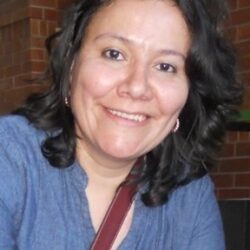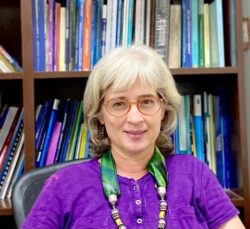Researchers Remain Committed to a Better Tomorrow in Latin America
POSTED September 30, 2021
|Democracy, Human Rights and Governance
By Nigel Gibbs, RTAC Communications Manager
Every year in the U.S., Americans observe National Hispanic Heritage Month from September 15 to October 15, to celebrate the histories, cultures, and contributions of American citizens whose ancestors came from Spain, Mexico, the Caribbean, and Central and South America. More than 60 million Americans identify as Hispanic, but little attention is given to the researchers and academics living and residing in Latin America and the contributions they make in their communities. To mark this special observance, the Research Technical Assistance Center is spotlighting two researchers from our Research Network making an impact for the betterment of society in their respective countries of Guatemala and El Salvador.
Dr. Alma Lucrecia Olivet López, Ph.D.
 Dr. Alma Lucrecia Olivet López, Ph.D. is a Systems Engineer with a master’s degree and a doctorate in Leadership and Organizational Development. She has more than two decades of experience as a professor at the Mariano Gálvez University of Guatemala.
Dr. Alma Lucrecia Olivet López, Ph.D. is a Systems Engineer with a master’s degree and a doctorate in Leadership and Organizational Development. She has more than two decades of experience as a professor at the Mariano Gálvez University of Guatemala.
Dr. Olivet’s work has focused on giving attention to some of Guatemala’s most underserved communities. She has worked as a consultant at the national and international level in the fields of food security and food sovereignty, land administration, rural economic development, and economic empowerment of women. The primary goal of her work is to focus on poverty, development, and social change.
Dr. Olivet has a deep love for her homeland of Guatemala and a strong commitment to social responsibility. “My purpose has been focused on new generations in overcoming deficiencies in the educational system and promoting a culture that fosters knowledge and encourages others to be innovators,” remarked Dr. Olivet.
Currently, she is creating a digital platform that promotes access to job opportunities as well as opportunities for academic and cultural development. She insists that her work must acknowledge and remain sensitive to labor rights and encourage the inclusion of underrepresented populations in Latin America.
When asked which researchers have left a positive influence in Latin America, she points to Dr. Oscar Augusto López Rivera and Dr. Rosario Leon.
Dr. Oscar Augusto López Rivera passed away in October 2020 and was a professor and researcher with more than 50 years of experience, and a key figure at the Latin American Faculty of Social Sciences (FLACSO) in Guatemala. He worked in rural areas with goal of uplifting impoverished communities and trained many of the top research professionals throughout Latin America.
Dr. Rosario Leon is a well-respected researcher in Bolivia. She is a founder and part of the Board of Directors of the Center for Social Studies (CERES) founded in 1978, in Cochabamba, Bolivia. Dr. Leon has extensive experience in the promotion and economic development of women as well as issues of social mobilization, social organization, and trade unionism in the Latin American region. As a senior member of the United Nations Food and Agriculture Organization (FAO) in Chile, she left great contributions in the implementation of projects in the agricultural sector and food security in Latin America and the Caribbean.
Ms. Pauline Martin
 Ms. Pauline Martin is the Director of Master’s in Education Policy and Evaluation at the Universidad Centroamericana José Simeón Cañas in El Salvador. Her areas of expertise in teacher training, education policy and evaluation, gangs and schools have helped her in her most recent research study, Education in Risk and Conflict Situations.
Ms. Pauline Martin is the Director of Master’s in Education Policy and Evaluation at the Universidad Centroamericana José Simeón Cañas in El Salvador. Her areas of expertise in teacher training, education policy and evaluation, gangs and schools have helped her in her most recent research study, Education in Risk and Conflict Situations.
“The Master’s in Education Policy and Evaluation is the only permanent graduate program of its kind in Central America that prepares professionals from diverse fields to contribute to education quality and equity improvement,” said Ms. Martin. As the director of the program, Ms. Martin is pleased for her program to have a vast variety of students of various ages, professional tracks and fields of study, which helps broaden who can participate in education policy. “As they strengthen their academic and professional abilities from a critical perspective, they are prepared to do research and policy analysis and contribute innovative solutions to educational problems in multiple levels and settings,” added the director.
Ms. Martin is particularly proud of the research program, Education in Risk and Conflict Situations. The program examines how schools are affected by the presence of gangs in the surrounding area. More specifically, the director is concerned with the dynamic of students who have ties to gangs and the school’s functioning and relationship with families and the broader community. “Our results will inform both national and international organizations so that better interventions can be designed to strengthen school quality in these contexts and contribute to gang membership prevention among students,” explained Ms. Martin.
Ms. Martin has seen much during her past 28 years as a U.S. expatriate living in El Salvador. She shares, “I have had the privilege of visiting my parts of the country and numerous schools, sharing experiences with teachers, principals, and families while accompanying education projects from our university. My dual-country experience contributes to understanding and offering new perspectives to education problems, as well as being bilingual, that opens doors for collaboration from other countries as well.”
For the director, one of the most important silver linings of COVID-19 pandemic has been the numerous opportunities for sharing the Salvadoran experience in international, virtual spaces, when distance and costs were formerly obstacles. Her goal is to share and offer the Salvadoran education analysis and research within the region and to the world, as she believes there is much to learn and dialogue to be shared.
When asked who she believes has positively influenced and enriched El Salvador and society, she points to Dr. Wim Savenije, Dr. José Miguel Cruz, and Dr. Olga Vásquez Munzón.
Dr. Wim Savenije, lead researcher in the Education in Risk and Conflict Situations program, is a Dutch citizen who has resided in Latin America since 2000, and is a leading expert on security policies, youth and gang violence and social exclusion. In addition to his work with the UCA El Salvador, he is associated with the Department of Social Anthropology and Policy, FLACSO- Argentina and the Center for Conflict Studies, Utrecht University, The Netherlands.
Dr. Cruz is currently with Florida International University (FIU) and the current Director of Research at FIU’s Kimberly Green Latin American and Caribbean Center. He is an expert in the area of criminal violence, gangs, police, democratization, and public opinion in Latin America and has contributed important research in the area of gang violence in society.
Dr. Olga Vásquez Munzón, Guatemalan, living in El Salvador. Dr. Munzón is a theologian and philosopher, and the first woman graduate of the Iberoamerican Philosophy Doctorate program at the Central American University. Her writings and teaching have contributed to rethinking educational research.
